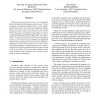Free Online Productivity Tools
i2Speak
i2Symbol
i2OCR
iTex2Img
iWeb2Print
iWeb2Shot
i2Type
iPdf2Split
iPdf2Merge
i2Bopomofo
i2Arabic
i2Style
i2Image
i2PDF
iLatex2Rtf
Sci2ools
146
click to vote
DEXAW
2004
IEEE
2004
IEEE
Development of Flexible Peer-To-Peer Information Systems Using Adaptable Mobile Agents
Wide-area networks provide an easy access to many different distributed and heterogeneous data sources. The development of automated operating tools is still complex, particularly because of evolution and adaptation requirements (to the data sources structures and to the network Quality of Service). The purpose of this paper is to evaluate the advantages of adaptable mobile agents in order to simplify the development and the deployment. As an experiment, we develop a prototype of peer-to-peer information system, and we show how agent mobility and adaptation abilities help in implementing various forms of adaptation: adaptation to the execution context, access to new servers with initially unknown communication protocols, dynamic modification of search algorithms based on results provided by the servers. Then, we show how these techniques can be easily extended to other problems such as search and upgrade of software components.
Related Content
| Added | 20 Aug 2010 |
| Updated | 20 Aug 2010 |
| Type | Conference |
| Year | 2004 |
| Where | DEXAW |
| Authors | Jean-Paul Arcangeli, Sebastien Leriche, Marc Pantel |
Comments (0)

